Wilkie Collins possesses the art of writing plays and stories so as to awaken and sustain the interest of the reader. He can create and work out a plot. It is true that the subject-matter of the plot is generally rather trivial, the characters commonplace, the whole tone and cast of the work conventional and insignificant. But the story, such as it is, has the merit of being neatly and pleasantly told. The author has set himself assiduously to inquire how the materials which he has been able to collect should be strung together, what proportion the several parts should bear to each other, and how the end of the story may be constantly anticipated by introductory hints without its precise character £ divulged. The result of this painstaking industry is that the reader is carried gently on, and is forced to take an interest in the web of circumstance which is spun for his benefit. Few writers give themselves so much trouble. If they have anything to say, they are ordinarily wrapped up in saying it, and trust to the guidance of their own genius to give it expression. If they have nothing to say, they are so happily constituted as not to perceive their own defects. It is, rare to find an author who, without originality, or great powers of any sort, has the gift of seeing how much arrangement and contrivance may do to enhance the value of the little he has to offer. This gift has been sufficient to ensure Mr. Collins a very considerable success, and his novels have been welcomed by the public, which always relishes the treat of small ingenuities, and likes any species of unambitious, intelligible entertainment. Besides, to have the art of narration implies the possession of many good literary qualities. It indicates that sort of good sense and good taste which rejects the superfluous, the incongruous, and the extravagant. It involves the power of putting a mass of detached minute facts into a decisive and appreciable shape. It makes us sure that the writer will keep clear of all that could annoy, weary, or offend us. The 'Dead Secret' is no secret to a numerous class of readers, nor will it long remain a mystery to those who set out in search of it for the first time. Perhaps it is doubtful how far the intentions of a novelist should be impenetrable,—what light should glimmer at the end of his shadowy vistas,-—what clues should be afforded to the pilgrims of romance. Of course no one is tempted on by utter darkness, yet in a tale which appeals simply to one element in the imagination—curiosity; it is a proof of defective development if we at once anticipate the catastrophe. The secret is buried (not dead), but its cofin is of crystal.
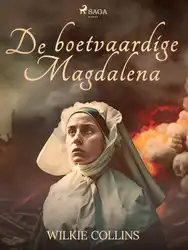
De boetvaardige Magdalena
Wilkie Collins
book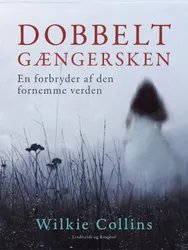
Dobbeltgængersken. En forbryder af den fornemme verden
Wilkie Collins
book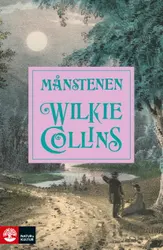
Månstenen
Wilkie Collins
book
The Woman in White
Wilkie Collins
book
No Thoroughfare :
Charles Dickens, Wilkie Collins
audiobook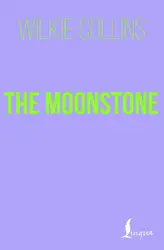
The Moonstone
Wilkie Collins
book
The Haunted Hotel :
Wilkie Collins
audiobook
Library of Masterpieces - 100 Books to Read in a Lifetime
illiam Shakespeare, Fyodor Dostoevsky, Louisa May Alcott, Miguel de Cervantes, John Milton, Jane Austen, Charlotte Brontë, Emily Brontë, Anne Brontë, William Makepeace Thackeray, George Eliot, Charles Dickens, Thomas Hardy, Jonathan Swift, Daniel Defoe, Joseph Conrad, Robert Louis Stevenson, Mary Shelley, Bram Stoker, Arthur Conan Doyle, Wilkie Collins, Oscar Wilde, T. S. Eliot, D. H. Lawrence, James Joyce, Virginia Woolf, E. M. Forster, Evelyn Waugh, Aldous Huxley, George Orwell, H. G. Wells, Lewis Carroll, Frances Hodgson Burnett, Kenneth Grahame, C. S. Lewis, Malcolm Lowry, Ford Madox Ford, Mark Twain, Jack London, Herman Melville, Ernest Hemingway, Jack Kerouac, Nathaniel Hawthorne, Edith Wharton, Walt Whitman, Kate Chopin, Harriet Beecher Stowe, Neale Hurston, Richard Wright, Raymond Chandler, Dashiell Hammett, F. Scott Fitzgerald, John Steinbeck, William Faulkner, Margaret Mitchell, Sylvia Plath, Carson McCullers, L. Frank Baum, L. M. Montgomery, Leo Tolstoy, Ivan Turgenev, Nikolai Gogol, Johann Wolfgang von Goethe, Friedrich Nietzsche, Thomas Mann, Franz Kafka, Erich Maria Remarque, Albert Camus, Marcel Proust, Jules Verne, Victor Hugo, Gustave Flaubert, Stendhal, Alexandre Dumas, Henrik Ibsen, Rudyard Kipling, Homer, Sophocles, Virgil, Laozi, Sun Tzu, Plato, Marcus Aurelius, Dante Alighieri, Niccolò Machiavelli
book
The Woman in White
Wilkie Collins
book
The Moonstone
Wilkie Collins
book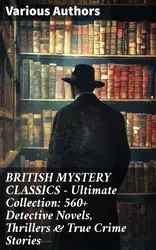
BRITISH MYSTERY CLASSICS - Ultimate Collection: 560+ Detective Novels, Thrillers & True Crime Stories : Unraveling British Mystery Classics: From Sherlock Holmes to Intricate Puzzles
Arthur Conan Doyle, Ernest Bramah, Arthur Morrison, Wilkie Collins, Thomas W. Hanshew, Edgar Wallace, Frank Froest, J. S. Fletcher, C. N. Williamson, A. M. Williamson, R. Austin Freeman, E. W. Hornung, G. K. Chesterton, H. C. McNeile, Victor L. Whitechurch, Annie Haynes, Ethel Lina White, Rober Barr, Isabel Ostander
book
BRITISH MYSTERIES Ultimate Collection: 560+ Detective Novels, Thriller Classics, Murder Mysteries, Whodunit Tales & True Crime Stories (Illustrated Edition)
Arthur Conan Doyle, Ernest Bramah, Arthur Morrison, Wilkie Collins, Thomas W. Hanshew, Edgar Wallace, Frank Froest, J. S. Fletcher, C. N. Williamson, A. M. Williamson, R. Austin Freeman, E. W. Hornung, G. K. Chesterton, H. C. McNeile, Victor L. Whitechurch, Annie Haynes, Ethel Lina White, Rober Barr, Isabel Ostander
book
